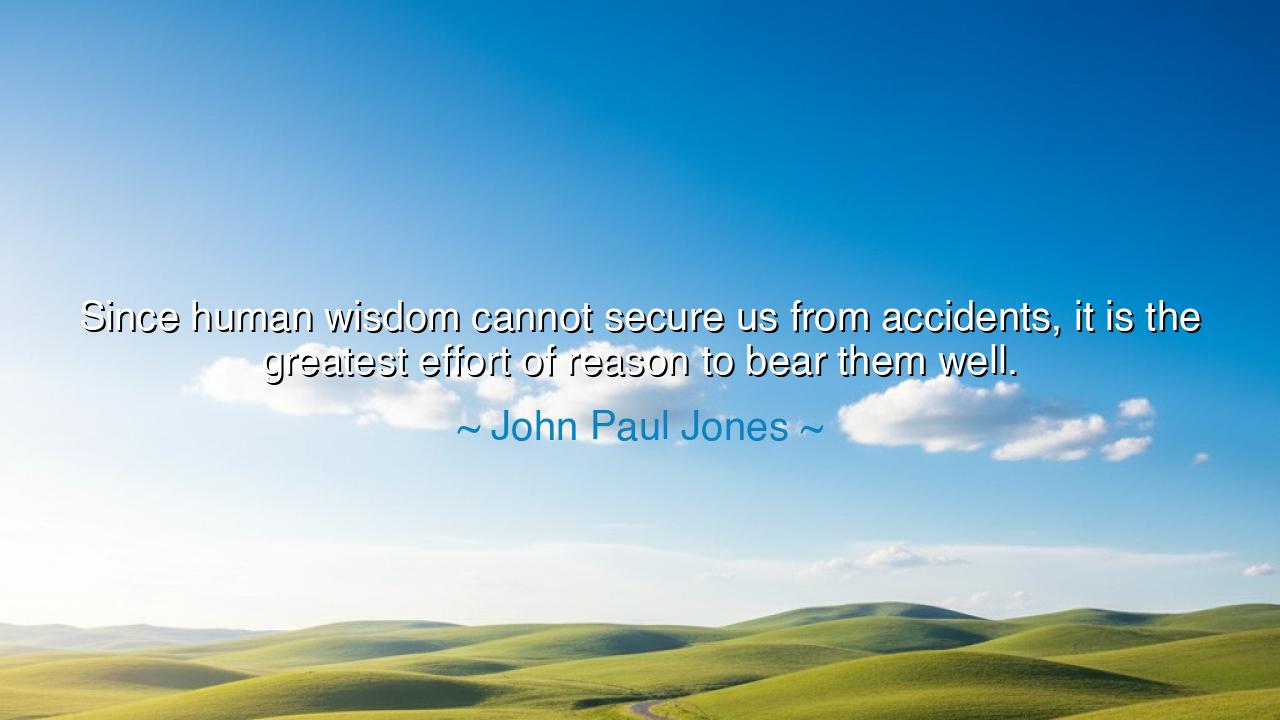
Since human wisdom cannot secure us from accidents, it is the
Since human wisdom cannot secure us from accidents, it is the greatest effort of reason to bear them well.






John Paul Jones, the sea warrior whose name is etched upon the scroll of American destiny, once declared: “Since human wisdom cannot secure us from accidents, it is the greatest effort of reason to bear them well.” In this, he reveals the eternal tension between the pride of man and the chaos of fate. For though men fashion plans, chart courses, and raise mighty fleets, still the winds of chance may scatter them. Wisdom does not shield us from the storm; it teaches us how to stand when the storm breaks.
To bear accidents well is the mark not of the fool, but of the hero. The weak rail against misfortune, cursing heaven, wasting strength in bitterness. But the strong—those who have drunk deeply from the well of reason—endure, adapt, and rise again. The shipwreck does not destroy them, for they make of wreckage a raft; the fire does not consume them, for they forge from its ashes new beginnings. The true test of wisdom is not in avoiding disaster, but in mastering one’s spirit when disaster strikes.
Consider the life of Jones himself, when his vessel, the Bonhomme Richard, was shattered and burning under the guns of the Serapis. Lesser men would have surrendered to despair. Yet Jones, with fierce calm, declared, “I have not yet begun to fight!” Though battered by accident and chaos, he bore it with iron spirit, turned the tide, and claimed victory from ruin. His courage embodied his own words: accidents may come, but reason’s greatest effort is to endure and to triumph.
History abounds with such souls. When the city of London burned in 1666, merchants lost fortunes, families lost homes, yet the people bore their calamity with steadfastness. From ashes they raised a greater city, crowned with St. Paul’s dome. Their wisdom did not prevent the fire, but their courage in bearing it well gave meaning to the catastrophe. Thus, the greatness of a people is measured not in their avoidance of misfortune, but in their rising after the fall.
O children of tomorrow, engrave this upon your hearts: accidents are the law of mortal life, but your response is the law of your soul. Let not despair conquer you, nor bitterness corrode you. When misfortune comes—and it shall—draw upon the strength of reason, the calm of wisdom, and bear it well. For therein lies the noblest victory: not freedom from storms, but mastery within them.






MDLe Nguyen Minh Dang
This quote raises questions about human limitation and the nature of control. It implies that wisdom is not a shield but a tool for endurance. I feel inspired to consider how embracing this mindset might reduce frustration, anxiety, and blame when misfortunes occur. Could focusing on our ability to bear challenges improve overall well-being and decision-making? I’d like a perspective on whether this approach is compatible with proactive planning or if it primarily emphasizes acceptance.
MNMinh Nguyen
Jones’s words prompt me to think about the relationship between wisdom and adversity. If accidents are unavoidable, then suffering gracefully becomes an art form and a test of reason. I’m curious how this philosophy aligns with resilience studies or psychological coping strategies. Does it suggest that emotional intelligence and rational acceptance are more valuable than precaution alone? How can individuals cultivate this capacity to respond well under unexpected circumstances?
THphan trong hai
I find this statement both realistic and empowering. It suggests that human effort is best directed not at absolute protection but at developing the character to endure challenges. I wonder how different cultures or individuals interpret this idea—does it encourage patience, stoicism, or proactive adaptation? How can this principle be taught or modeled, especially in education or leadership, to prepare people to handle the inevitable uncertainties of life?
Tthien
This quote makes me reflect on the limitations of human foresight. It’s humbling to acknowledge that accidents cannot be completely prevented. I’m curious whether Jones is advocating for a mindset of acceptance or active endurance. How does this idea intersect with modern approaches to risk management, mental health, or philosophy? Could learning to bear misfortune gracefully reduce stress and improve long-term decision-making, even when events are beyond our control?
MTMy Le Mai Tra
Reading this, I’m struck by the emphasis on resilience over control. Jones seems to suggest that no matter how wise or prepared we are, accidents are inevitable, and our true measure is how we respond. I wonder how this perspective can be applied to everyday life, from personal setbacks to larger societal crises. Can cultivating the ability to bear misfortune well be considered a higher form of wisdom than merely avoiding it?